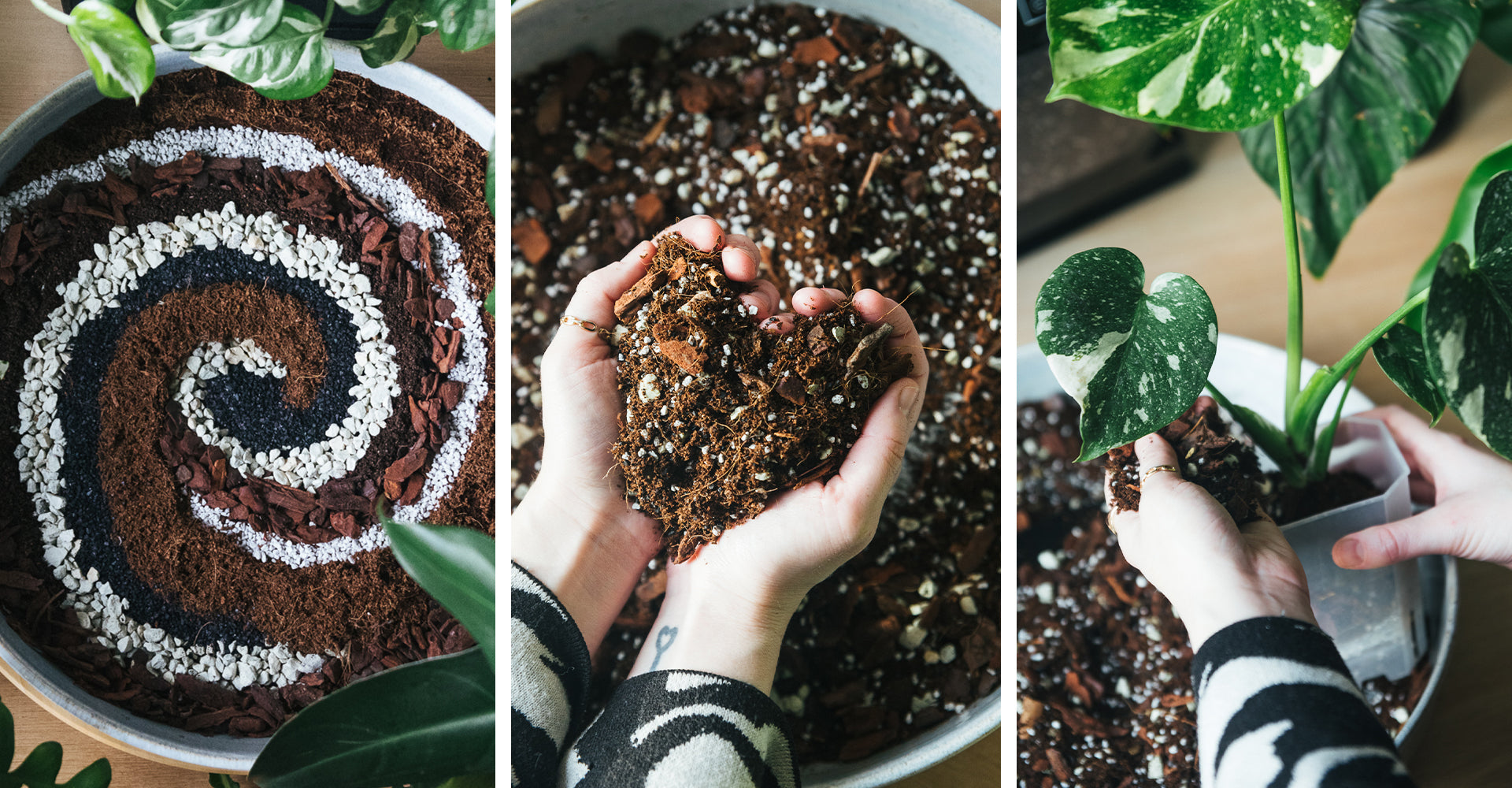No, Monsteras do not like coffee grounds as they can attract fungus gnats and lead to fungal growth. Instead, it is recommended to use other methods for fertilizing and caring for Monsteras.
Monsteras, or Monstera deliciosa, are popular houseplants known for their large, unique leaves with natural holes called fenestrations. These tropical plants thrive in warm, humid environments and require a good amount of water and gentle sunlight. However, when it comes to fertilizing, using coffee grounds is not recommended for Monsteras as it can have adverse effects.
Coffee grounds can attract fungus gnats and promote fungal growth, which can harm the plant. Therefore, it is best to find alternative fertilization methods for these beautiful indoor plants.
The Benefits Of Coffee Grounds For Monsteras
Monsteras, with their iconic large, glossy leaves, are popular houseplants known for their ability to thrive in a variety of conditions. If you’re a Mone Mbotanical enthusiast, you may be wondering if coffee grounds can benefit your Monstera. The good news is that coffee grounds can indeed provide several advantages for these tropical beauties.
Coffee Grounds As A Natural Fertilizer For Monsteras
Using coffee grounds as a natural fertilizer for Monsteras can be an excellent way to promote their growth and overall health. Coffee grounds are rich in nitrogen, phosphorus, and potassium, also known as NPK, which are essential nutrients for plant growth. The high nitrogen content in coffee grounds aids in leaf development, while phosphorus promotes root growth and potassium helps with overall plant health.
Nutrients Found In Coffee Grounds That Promote Plant Growth
Aside from NPK, coffee grounds also contain other essential macronutrients and micronutrients that are beneficial for Monsteras. These include magnesium, calcium, and trace elements like iron, copper, and zinc. Magnesium helps with chlorophyll production, which is essential for photosynthesis and overall plant vigor. Additionally, calcium contributes to strengthening cell walls, promoting strong stems and leaves. The trace elements found in coffee grounds provide additional support for Monsteras’ overall health and growth.
How Coffee Grounds Improve Soil Quality For Monsteras
Coffee grounds can significantly improve soil quality for Monsteras by enhancing its texture, drainage, and water-holding capacity. When added to the soil, coffee grounds act as organic matter, improving soil structure and increasing its ability to retain moisture. The organic matter in coffee grounds also attracts and promotes beneficial microorganisms in the soil, fostering a healthy soil ecosystem. Additionally, coffee grounds can help regulate soil pH, as they have a slightly acidic nature, which Monsteras prefer.
To maximize the benefits of coffee grounds and prevent any potential negative effects, it is important to use them in moderation. As with any fertilizer, too much can be detrimental to your plants. Aim to mix coffee grounds with other organic matter or compost and incorporate them into the soil or use them as a mulch. This will ensure a slow release of nutrients and minimize the risk of burning the plant’s roots.
In conclusion, coffee grounds can be a valuable addition to your Monstera care routine. They provide essential nutrients, improve soil quality, and promote overall plant health and growth. So, the next time you enjoy your cup of coffee, consider saving those grounds for your Monsteras and watch them thrive.
How To Use Coffee Grounds For Monsteras
html
If you’re a coffee lover, you might be wondering if you can put those coffee grounds to good use in your garden. The good news is that monsteras, with their love for organic matter, can benefit from the addition of coffee grounds to their soil. We’re here to guide you on the best practices for using coffee grounds to keep your monsteras happy and healthy.
Best Practices For Incorporating Coffee Grounds Into Monsteras’ Soil
To get the maximum benefits from coffee grounds, there are a few best practices you should follow when incorporating them into your monsteras’ soil:
- Mix it in with the existing potting soil. When adding coffee grounds, ensure you mix them thoroughly with the potting mix to avoid clumping and to distribute the nutrients evenly.
- Use used coffee grounds. Fresh coffee grounds can be high in acidity and caffeine, which may have a negative impact on your plants. Opt for used coffee grounds instead, as they are less acidic and will be gentler on your monsteras.
- Avoid overfeeding. While monsteras love organic matter, it’s important not to overuse coffee grounds. Too much of a good thing can lead to nutrient imbalances and harm the plant. Use coffee grounds as part of a balanced feeding routine rather than relying solely on them.
Mixing Coffee Grounds With Other Organic Materials For Optimal Results
In order to provide your monsteras with the best possible soil, consider mixing coffee grounds with other organic materials. This will help create a nutrient-rich environment that will promote healthy growth. Here are a few options to consider:
- Compost: Coffee grounds can be added to your compost pile and used as part of a well-rounded compost mix. This will provide a variety of nutrients for your monsteras.
- Leaf mold: Mixing coffee grounds with leaf mold can help improve soil structure and water retention, while also adding valuable organic matter.
- Coconut coir: When mixed with coffee grounds, coconut coir can help improve drainage and aeration in the soil.
Avoiding Overusing Coffee Grounds And Potential Negative Effects
While coffee grounds can provide numerous benefits to your monsteras, it’s important to avoid overusing them. Here are a few potential negative effects of using too many coffee grounds:
- Acidity imbalance: Coffee grounds are slightly acidic, and too much acidity can harm your plant. Ensure you monitor the pH of the soil and adjust accordingly.
- Nutrient imbalances: Relying solely on coffee grounds can lead to nutrient imbalances in the soil. Be sure to provide a well-rounded fertilization routine that includes other organic materials.
- Excessive moisture retention: Coffee grounds have the ability to retain moisture, which can be problematic if your monsteras’ soil becomes waterlogged. Ensure proper drainage to avoid root rot.
By following these best practices and mixing coffee grounds with other organic materials, you can provide your monsteras with a nutrient-rich environment that will promote healthy growth. Just remember to avoid overusing coffee grounds and monitor your plants’ response to ensure they’re thriving.
Common Mistakes When Using Coffee Grounds For Monsteras
Monsteras, also known as Swiss cheese plants, are beloved for their large, beautiful leaves and easy care requirements. Many plant enthusiasts choose to use coffee grounds as a natural fertilizer for their Monsteras, but there are some common mistakes to be aware of when using coffee grounds in the care of these plants.
Overfertilization And The Risk Of Nutrient Imbalances
One common mistake when using coffee grounds for Monsteras is overfertilization. While coffee grounds can provide nutrients to the soil, it is important to use them in moderation. Excessive use of coffee grounds can lead to an imbalance of nutrients in the soil, which can be detrimental to the health of your Monsteras.
Using coffee grounds as a fertilizer in excess can result in an accumulation of nutrients, especially nitrogen, which can cause leaf burn, stunted growth, and even root damage. It is important to remember that Monsteras do not require constant feeding and can thrive in well-draining soil with balanced nutrient levels.
Potential For Soil Acidity With Excessive Coffee Grounds Usage
Another mistake to avoid when using coffee grounds for Monsteras is the potential for soil acidity. Coffee grounds are naturally acidic, and overusing them can lead to a decrease in soil pH, making it too acidic for the Monsteras’ liking. Monsteras prefer slightly acidic to neutral soil with a pH range of 6 to 7.
Excessive acidity in the soil can affect the plant’s ability to absorb nutrients properly, leading to nutrient deficiencies. It can also have detrimental effects on soil microorganisms, which play a crucial role in maintaining soil health and supporting the plant’s overall well-being.
Understanding The Importance Of Moderation And Balance
When using coffee grounds for Monsteras, it is essential to understand the importance of moderation and balance. While coffee grounds can provide some benefits to the plants, it is crucial not to overdo it. Using coffee grounds in moderation and in conjunction with other organic fertilizers and amendments can help ensure a healthy and thriving Monstera.
To achieve the right balance, it is recommended to mix coffee grounds with other organic materials such as compost, coconut coir, or peat moss. This will help dilute the acidity and provide a well-rounded source of nutrients for your Monsteras.
Remember to monitor your plants’ response to the coffee ground application and make adjustments as needed. Look for signs of nutrient deficiencies or excesses, such as yellowing leaves or stunted growth. Regularly testing the pH of the soil can also help you maintain the optimal growing conditions for your Monsteras.
In conclusion, while coffee grounds can be a beneficial addition to the care routine of Monsteras, it is crucial to avoid common mistakes such as overfertilization and imbalances in soil acidity. Understanding the importance of moderation and balance will help you provide the best care for your beloved Swiss cheese plants.

Credit: www.createcultivate.com
Alternative Fertilizers For Monsteras
html
Exploring Other Organic Fertilizers Suitable For Monsteras
Monsteras are popular houseplants known for their distinctive and attractive foliage. To keep your Monsteras thriving, it’s important to provide them with the right nutrients. While coffee grounds are a great organic fertilizer option for Monsteras, there are other alternatives you can explore to ensure your plants get the essential nutrients they need.
Comparing The Pros And Cons Of Different Fertilizers
When it comes to fertilizing your Monsteras, it’s important to consider the pros and cons of different options. Here’s a comparison of popular organic fertilizers:
| Fertilizer | Pros | Cons |
|---|---|---|
| Compost |
|
|
| Manure |
|
|
| Seaweed extract |
|
|
Each option has its advantages and disadvantages, so choose the one that best suits your preferences and gardening goals.
Supplementing Coffee Grounds With Additional Plant Nutrients
If you decide to use coffee grounds as a fertilizer for your Monsteras, it’s important to note that they should be used in moderation. Coffee grounds are a good source of nitrogen, but they should be supplemented with other nutrients to ensure balanced plant growth.
Some additional plant nutrients you can consider supplementing with coffee grounds include:
- Composted kitchen scraps: Provides a diverse range of nutrients.
- Eggshells: Rich in calcium, which supports healthy root development.
- Banana peels: Contains potassium, which promotes flower and fruit formation.
By incorporating these additional nutrients along with coffee grounds, you can provide a well-rounded fertilization approach for your Monsteras.
Maximizing Monsteras’ Growth Potential
html
Monsteras are stunningly beautiful plants that can make a statement in any home or garden. To ensure they reach their full growth potential, it is essential to provide them with proper care and attention. Creating a comprehensive plant care routine for Monsteras is the first step towards achieving optimal growth. Understanding the specific needs of Monsteras and integrating coffee grounds as part of a well-rounded care regimen can further enhance their vitality and beauty.
Creating A Comprehensive Plant Care Routine For Monsteras
When it comes to taking care of Monsteras, a comprehensive plant care routine is crucial for their growth and well-being. Here are some essential aspects to consider:
- Light: Monsteras thrive in bright, indirect light. Place them near a window where they can receive filtered sunlight.
- Watering: Monsteras prefer moderately moist soil but can suffer from overwatering. Allow the top few inches of the soil to dry out before watering again.
- Humidity: These tropical plants love humidity. Increase humidity levels by misting the leaves regularly or placing a humidifier nearby.
- Fertilizing: Provide Monsteras with balanced liquid fertilizer every month during the growing season to support their growth.
- Pruning: Regularly prune your Monstera to eliminate dead or damaged leaves and encourage new growth.
Understanding The Specific Needs Of Monsteras For Optimal Growth
Monsteras have specific requirements in terms of their growth. Consider the following factors:
- Potting Soil: Use well-draining potting soil rich in organic matter to ensure the proper growth of Monsteras.
- Temperature: Monsteras thrive in temperatures between 65-85°F (18-29°C). Avoid exposing them to extreme cold or hot conditions.
- Air Circulation: Adequate air circulation is essential to prevent stagnant air, which can lead to fungal infections.
- Support: Provide a sturdy support system for Monsteras with strong aerial roots, such as a moss pole or trellis.
Integrating Coffee Grounds As Part Of A Well-rounded Care Regimen
Coffee grounds, when used correctly, can be a beneficial addition to a well-rounded care regimen for Monsteras. Here’s how you can integrate coffee grounds into your plant care routine:
Coffee grounds are rich in nitrogen, which is a crucial nutrient for plant growth. When used as a part of compost or added to the soil, coffee grounds can provide a slow-release nitrogen source for Monsteras. This can lead to healthier foliage and increased growth.
However, it is important to use coffee grounds in moderation, as excessive amounts can lead to acidity in the soil. Too much acidity can negatively affect Monsteras, as they prefer slightly acidic to neutral soil pH.
To incorporate coffee grounds into your care regimen, follow these steps:
- Allow the used coffee grounds to dry completely.
- Mix the dried coffee grounds with compost or potting soil.
- Apply the mixture as a top dressing or incorporate it into the soil around the base of your Monstera.
- Water the plant as usual, making sure not to oversaturate the soil.
Frequently Asked Questions For Do Monsteras Like Coffee Grounds
Which Plants Do Not Like Coffee Grounds?
Coffee grounds are not liked by some plants, such as geranium, asparagus fern, Chinese mustard, and Italian ryegrass. They inhibit their growth. However, coffee grounds can improve yields for soybeans and cabbage when used as mulch and compost.
Is It Ok To Put Coffee Grounds In Houseplants?
It is OK to put coffee grounds in houseplants, but it is better to use used coffee grounds instead of fresh ones. Fresh grounds can be too acidic and high in caffeine, which can harm your houseplants. Used grounds are lower in acidity and can provide some nutrients for your plants.
Is It Good To Water Houseplants With Coffee?
Watering houseplants with coffee is beneficial as it provides plants with nitrogen, calcium, and magnesium. However, it’s best to use used coffee grounds instead of fresh ones to avoid high acidity and caffeine content. Coffee grounds can improve the growth of certain plants, but it’s important to dilute the coffee before using it to prevent fungal growth and attract fungus gnats.
How Do You Make Monsteras Happy?
To make Monsteras happy, provide a warm, humid environment, water regularly, and give them gentle sunlight. Avoid using coffee grounds directly on the plants as it can cause fungal growth and attract fungus gnats.
Conclusion
Using coffee grounds on Monsteras can be beneficial due to their high nitrogen content. However, it’s important to be cautious as coffee grounds can attract fungus gnats and promote fungal growth if used directly on the plants. It’s best to use composted coffee grounds or dilute them in water before applying to the soil.
Overall, coffee grounds can be a helpful addition to the care routine of Monsteras, but it’s essential to use them properly to avoid any negative effects.








